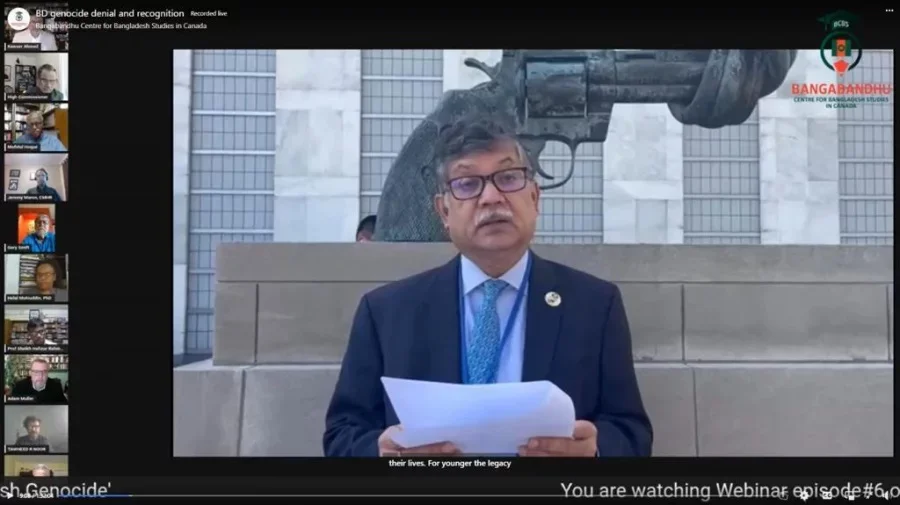Seminar: Canadian museum appropriate venue to exhibit 1971 genocide
Share on:

Primary focus on reviewing progress made towards genocide recognition
Speakers at a seminar have said the events of 1971 in Bangladesh constitute “genocide” and that the Canadian Museum for Human Rights is the “appropriate” venue to exhibit this history, emphasizing the need to prevent such atrocities from happening again in the future.
The Bangabandhu Center for Bangladesh Studies in Canada (BCBS), in collaboration with the Bangladesh High Commission in Canada, the Liberation War Museum of Bangladesh, the Centre for Genocide Studies of the University of Dhaka and the Conflict and Resilience Research Institute Canada (CRRIC), organized the international seminar titled “Denial and Recognize: The Case of Bangladesh Genocide” on Friday.
The Bangladesh High Commission said the primary focus of this seminar was to review the progress made towards seeking recognition of the genocide perpetrated by the Pakistani occupation forces in 1971 for exhibition at the Canadian Museum for Human Rights (CMHR).
Foreign Secretary Masud Bin Momen was the chief guest, while Bangladesh High Commissioner in Canada Dr Khalilur Rahman addressed the seminar as chief patron of the BCBS.
Prof Dr Adam Muller, professor and director of Peace and Conflict Studies at the University of Manitoba; Dr Jeremy Maron, acting head of curation at the Canadian Museum of Human Rights; Mofidul Hoque, trustee of the Liberation War Museum of Bangladesh; Prof Sheikh Hafizur Rahman (Karzon), director of the Centre for Genocide Studies of the University of Dhaka; Gary Senft of Rotary Peacedays; Dr Tawheed Reza Noor, visiting scholar at the State University of New York in Binghamton; and Dr Helal Mohiuddin, professor at North South University and director of CRRIC were present, among others.
In his address, Masud Bin Momen highlighted the lasting impact of the genocide perpetrated by the Pakistani occupation forces in 1971 and the importance of greater recognition given the enormity and scale of violence aimed at exterminating a nation.
“The trauma of 1971 is still vivid in our nation's collective memory, and its repercussions have traumatized a generation,” he said.
He thanked those who have tirelessly worked to highlight this dark chapter in history, including the Bangladesh Liberation War Museum and the Centre for Genocide Studies, and requested the CMHR to finalize the formalities for the exhibition of the genocide.
Prof Adam Muller delivered the keynote speech, highlighting the importance of recognition in shaping identities and empowering victims.
He stressed that denial of the Bangladesh genocide robs victims of their victimhood and weakens claims for post-conflict justice and redress.
Recognizing the genocide, he argued, not only affirms the experiences and suffering of Bangladeshis but also challenges the idea that perpetrators may act with impunity.
He also stated that punishment and accountability are key to preventing future genocides, and impunity is an enabler of genocide.
Jeremy Maron, representing the Canadian Museum for Human Rights, emphasized the importance of fighting against denial and distortion of human rights violations, including genocides and crimes against humanity.
He discussed the museum's commitment to developing new content related to the 1971 Bangladesh genocide in their Breaking the Silence gallery, which focuses on addressing denial, distortion, and minimization of human rights violations.
High Commissioner Dr Khalilur Rahman reiterated the urgency of recognizing the 1971 genocide, emphasizing that denial of past genocides contributes to their repetition in the present.
He expressed gratitude for the collaboration and support received from various organizations, including the Canadian Museum for Human Rights.
He urged the Canadian Museum for Human Rights to organize Breaking the Silence to display the atrocities committed in 1971 as soon as possible and said that top representatives from partner organizations would attend the event.

